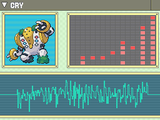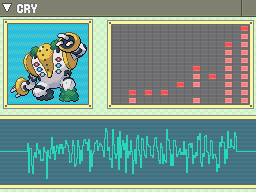Cry: Difference between revisions
N. Onymous (talk | contribs) (→Trivia: - no low-health cries in VI) |
m (→In the games) |
||
| Line 13: | Line 13: | ||
The Pokémon in the [[Pokémon Black Version 2 and Pokémon White Version 2 Animated Trailer]] make realistic, animal-like sounds that differ from both their in-game and anime cries. | The Pokémon in the [[Pokémon Black Version 2 and Pokémon White Version 2 Animated Trailer]] make realistic, animal-like sounds that differ from both their in-game and anime cries. | ||
In {{g|X and Y}}, the cries of most<!--all?--> Pokémon from previous Generations were updated through the {{wp|Nintendo 3DS}}'s technology. The cries of some Pokémon, such as {{p|Raichu}}, {{p|Corphish}}, and {{p| | In {{g|X and Y}}, the cries of most<!--all?--> Pokémon from previous Generations were updated through the {{wp|Nintendo 3DS}}'s technology. The cries of some Pokémon, such as {{p|Raichu}}, {{p|Corphish}}, and {{p|Shiftry}}, were almost completely changed. {{p|Pikachu}}'s cry was replaced by its voice from the {{pkmn|anime}}, provided by [[Ikue Ohtani]] (much like for {{ga|Red's Pikachu}} in {{v2|Yellow}} and [[Pokémon Stadium 2]]). | ||
==In the anime== | ==In the anime== | ||
Revision as of 19:38, 5 April 2014
- Cry redirects here. If you were looking for the move, see Growl.
A Pokémon's cry (Japanese: なきごえ cry) is the sound it makes. Depending on the continuity, this can either be a unique sound, or only the Pokémon's name and various phrases derived from its name. There are also several instances of talking Pokémon.
In the games
When a Pokémon is released from its Poké Ball, it will call out its cry, which consists of an electronically made "noise." It will also cry out when using certain moves, such as Growl, Roar, and Hyper Voice. If the Pokémon faints or comes into battle when injured during Generation III and later, the cry will sound, but it will be altered slightly. The cry is also changed noticeably when a Pokémon is sent into a battle with a status condition. Pokémon related by evolution (e.g., Charmander and Charmeleon) and association (Pansage, Pansear, and Panpour) will often have notably similar cries, though others may sound very different (Remoraid and Octillery), especially if from different Generations (Kirlia and Gallade).
In Ruby, Sapphire, Emerald, FireRed, and LeafGreen, cries of the Pokémon found in the player's current location can occasionally be heard while walking in the overworld. In Pokémon Emerald, these cries are heard more often if the first Pokémon in the player's party has the Ability Swarm.
In the Pokémon Stadium series, each Pokémon's original cry was remade through the Nintendo 64's technology, though most of these cries resemble the Game Boy versions closely. This was not carried over into later console games, which use the same cries as the handheld games.
The Pokémon in the Pokémon Black Version 2 and Pokémon White Version 2 Animated Trailer make realistic, animal-like sounds that differ from both their in-game and anime cries.
In Pokémon X and Y, the cries of most Pokémon from previous Generations were updated through the Nintendo 3DS's technology. The cries of some Pokémon, such as Raichu, Corphish, and Shiftry, were almost completely changed. Pikachu's cry was replaced by its voice from the anime, provided by Ikue Ohtani (much like for Red's Pikachu in Yellow and Pokémon Stadium 2).
In the anime
Most Pokémon will only say their names, and will communicate using those syllables. For example, Ash's Pikachu has been known to use the three syllables in the word "Pikachu" in various combinations to refer to several characters, including Ash (Pikapi), Misty (PiKachupi), Brock (PikaChu), Dawn (Pikaka), Togepi (Pipipi), Team Rocket (Pipikachu), Bulbasaur (Pikakapika) and "My name is Pikachu" (Pika, Pikachu).
Due to Pokémon being dubbed, the original cry of a Pokémon is sometimes preserved in the anime, more often than not if the name is either similar or the same in Japanese and English. One example is Charizard, which can be heard to cry out Lizardon if listened to closely enough. Likewise, an Onix roar sounds like Iwark and Wooper's cry sounds like "Upah!". Arbok, in addition, is heard to hiss "Charbok(a)," despite both its English and Japanese names being "Arbok."
Some Pokémon's cries are entirely unrelated to their names in any language. For example, Victreebel screeches loudly, Staryu quickly yells "Heah!" in an echoing male voice, and Starmie says "Hoo!" in a breathy, echoing female voice. Most Legendary Pokémon that cannot speak to humans instead roar, screech, or make other sounds. Krabby's and Kingler's cry, which sounds similar to "cookie", is sometimes used as an internet meme.
Gallery
The cry page exists neither in the first two generations nor their remakes. Instead, the cry plays if the word "Cry" is selected in the Pokédex. In Generation VI, the cry page is shared with the forms page.

|

|

|
| RSE | Platinum | B2W2 |
|---|
Trivia
- Before Generation VI, six pairs of Generation I Pokemon shared near-identical cries:
- Charizard's cry was very slightly higher-pitched and shorter than Rhyhorn's, by 0.006 of a second.
- Caterpie's cry was slightly longer than Goldeen's, by 0.071 of a second.
- Wigglytuff's cry was slightly lower-pitched and longer than Poliwhirl's, by 0.006 of a second.
- Vileplume's cry was slightly higher-pitched and longer than Aerodactyl's, by 0.059 of a second.
- Poliwag's cry was very slightly lower-pitched than Ditto's.
- Machop's cry was slightly lower-pitched and shorter than Omanyte's, by 0.002 of a second.
- Despite there being 151 Pokémon in Generation I, there are only 37 completely different cries in the Generation I games. However, similar cries are distinguished by differences in pitch, speed, echo, or disabling one of the sound channels. For example, Charmander and Charmeleon's base cries are the same, but Charmeleon's is lower-pitched than Charmander's. Another example is that Metapod and Abra have the same base cry, but Metapod's only plays one sound channel. In Generation II, there were 30 new base cries introduced, applying the same techniques as before. The only Generation II cries based on older ones belong to Crobat and Umbreon, both of which evolve from Generation I Pokémon.
- As of Generation V, Jynx has the longest cry at 2.238 seconds, while Pidgey's is the shortest at 0.181 seconds.
- Pikachu is the only Pokémon to have multiple cries without changing forms. In Pokémon Yellow, the starting Pikachu has a total of forty cries, though only two occur in battle. Like the anime, all are variations of its name and voiced by Ikue Ohtani.[1]
- Because the Game Boy lacks high-quality sound, Game Freak had to think of different ways to recreate Pikachu's cry. Junichi Masuda converted the sound into one-bit data, recreating the sound of Ohtani's voice.[2]
- This is also the case if the starter Pikachu is brought to battle in Pokémon Stadium or Pokémon Stadium 2.
- This feature returned in Pokémon X and Y with all-new voice recordings. In these games, Pikachu has 15 cries, two of which occur in battle and the rest in Pokémon-Amie.
- Possibly due to improved technology, very few Pokémon introduced since Generation III have had similar cries, and those that do are usually related by evolution or association as they were in Generation I. As the generations pass, the calls of new Pokémon sound more refined and realistic, while the cries of Pokémon released in previous generations sound comparatively more like the electronic beeps they are. In particular, cries introduced since Generation IV are mostly recognizable, digitized sounds, such as birds chirping for Starly or a xylophone for Kricketot.
- In Generation I, when a player's Pokémon has low HP in battle, its cry will be distorted. This is likely due to the game performing two simultaneous processes: one for the alarm sound of low HP and another to play the Pokémon's cry. This problem was fixed in Generation II.
- This situation occurs both when the Pokémon is sent out into battle and when its information is checked.
- This may have been inspiration for the alteration to cries that occurs when an injured Pokémon is sent into battle from Generation III to Generation V.
- The Pokemon with the most cry changes throughout the series is Haunter, having been changed in Generations II, III, and VI. In Generation I, it is a high-pitched, four-note beeping with low-pitched buzzing in the background. In Generation II, the beeping was replaced by a three-note jingle. The jingle was absent in Generations III through V, leaving just the buzz. In Generation VI, its cry was overhauled to sound like an update of its original one.
- In Generation III, the cries are actually played at 0.9× the speed of the original samples.
- In Generation IV, if the Nintendo DS is put into sleep mode in the middle of a Pokémon's cry, the cry will start over when the DS is opened again. This happens both when a Pokémon is coming into battle and fainting.
- Shaymin's Sky Forme and Land Forme, all of Kyurem's Formes and the Forces of Nature's Therian Formes have different cries.
- Similarly, when Pokémon undergo Mega Evolution, their cry is altered, sometimes dramatically.
- Despite not being a Pokémon, Dark Rust has its own cry in Pokémon Rumble Blast.
- Similarly, all Pokéstar Studios opponents have their own cries despite not being Pokémon.
Related articles
References
- ↑ http://www.youtube.com/watch?v=LNV4P3DFPps Pikachu's 40 cries in Yellow
- ↑ http://www.gamefreak.co.jp/blog/dir_english/?p=144 Game Freak blog

|
This game mechanic article is part of Project Games, a Bulbapedia project that aims to write comprehensive articles on the Pokémon games. |

